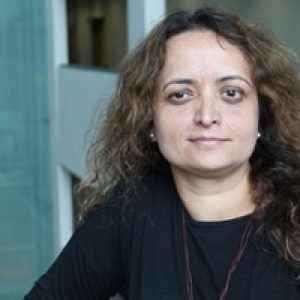Latest news
City researcher launches book on women’s health, communications and development
May 10, 2023
The panel “How Women and Health NGOs Use Communications Strategically to Advocate for Gender Equality and Reproductive Health” was held on 19 April to mark the launch of Dr Carolina Matos’ book Gender, communications and reproductive health in international development. Presented and moderated by Professor Sallie Hughes, Associate Dean for Global Engagement, the panel was composed of the Dean of the School of Communication at the University of Miami, Professor Karin Wilkins, Professors Suzanne Clibsy (University of Coventry, UK) and Rosalind Gill (City, University of London) and the CEO of NGO Reprolatina, Margarita, and was attended by NGO practitioners, academics and students from across the world.
During the panel discussion, Matos presented the research findings of her project, which was funded by the Global Challenges Research Fund (GCRF). In the project, Matos unpacked the complexities of the relationship between women’s health, communications and development. The research further contributes to the fields of international development, health communications and gender studies, and further advances the debate on the role of feminist NGOs in advocating for women’s rights. With a postcolonial critique of the role of NGOs in development, Matos illuminates the strategic use of communications in the mediation and advocacy of gender equality and reproductive health.
More about the book:
The project Gender, communication and reproductive health in international development was funded by the Global Challenges Research Fund (GCRF) and examined 52 feminist and health NGOs from across the world and how they are improving discourse on sexuality and reproductive health in the public sphere. The research adopted a mixed methods approach which included in-depth interviews with gender experts and practitioners as well as a survey-style questionnaire with communications experts, critical discourse analysis (CDA) of the institutional websites of the organisations, including content analysis of their social media engagement and presence. A core question was “How can communications be better used for advocacy on SRHR?” This large research project included the participation of early-career researchers from the UK, India and Brazil. The research investigated how these organisations are making use of communications amid various contemporary challenges, including the proliferation of misinformation about women’s rights and health in the public sphere due to the actions of oppositional far-right conservative groups.
Bio of the presenters
Professor Karin Wilkins is Dean of the School of Communication at the University of Miami. Before coming to UM in September 2019 she was Associate Dean for Faculty Advancement and Strategic Initiatives with the Moody College of Communication at the University of Texas at Austin. She has won numerous awards for her research, service and teaching, and chaired the Intercultural/Development Division of the International Communication Association. Her work addresses scholarship in the fields of development communication, global communication, and political engagement.
Dr Carolina Matos is a visiting associate professor in Global Communications, School of Communication, University of Miami and senior lecturer in Media and Sociology at the Department of Media, Culture and Creative Industries of the School of Communications and Creativity at City, University of London. Matos is the author of various books, papers and articles and her research is in the area of media, gender and development. She is also PD of the Masters in Media and Communications and International Communications and Development (ICD).
Sallie Hughes is Professor in the Department of Journalism and Media Management and Associate Dean for Global Initiatives. She was senior research lead and faculty director at the University of Miami Institute for Advanced Study of the Americas from 2016-2021. She coordinates the Latin American region of the Worlds of Journalism Study, the largest cross-national study of journalists’ working conditions. She is the author of Newsrooms in Conflict: Journalism and the Democratization of Mexico and co-author of Making a Life in Multiethnic Miami: Immigration and the Rise of a Global City among others.
Professor Rosalind Gill studied Sociology and Psychology at Exeter University and completed her PhD in Social Psychology at the Discourse and Rhetoric Group (DARG), Loughborough University in 1991. With an interdisciplinary background, she has worked across a number of disciplines including Sociology, Gender Studies and Media and Communications. Gill is known for her research interests in gender and media, cultural and creative work, and mediated intimacy. For the last decade, she has made a significant contribution to debates about the “sexualization of culture”.
Suzanne Clisby is Professor of Gender Studies at the Centre for Global Learning, Education and Attainment at Coventry University. She is currently Co-Director of the RCUK GCRF Global Gender and Cultures of Equality (GlobalGRACE) Project (2017-21) (globalgrace.net) and was the Director of the Horizon 2020 Marie S. Curie Gender and Cultures of Equality in Europe (GRACE) Project (2015-19) (graceproject.eu). She is an Expert Advisor for the EU-funded GEMMA programme and the GCRF-funded None in Three Project and an Editor of the Journal of Gender Studies (Routledge, Taylor & Francis).
Dr Margarita Diaz is president and CEO of the NGO Reprolatina based in Campinas, Sao Paulo, Brazil. Diaz is an obstetrician nurse who graduated from Chile with a master’s and doctorate in education from Unicamp (Brazil). She runs the NGO with the Vice President and psychologist Francisco Cabral. The NGO works with sexual and reproductive health and rights in Brazil and in other countries in Latin America and the Caribbean.

